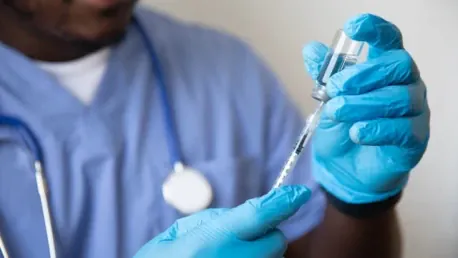The recent World Health Organization (WHO) mission to Vietnam focused on evaluating the country’s efforts to eliminate viral hepatitis, with a delegation of representatives from WHO, international partners, and experts from the Doherty Institute’s WHO Collaborating Centre for Viral Hepatitis. The delegation included experts such as Professor Ben Cowie, Ms. Lien Tran, and Dr. Beth Hamilton. Their mission encompassed visits to a multitude of regions within the country including Hanoi, Son La Province, Bac Ninh Province, An Giang Province, and Ho Chi Minh City. These visits provided a comprehensive assessment of Vietnam’s hepatitis program across urban, regional, and rural areas, presenting a thorough picture of the nation’s efforts and challenges.
The evaluations offered critical insights into regional disparities in priorities concerning vaccination access and health system capacity. The findings from this mission will be pivotal in supporting Vietnam’s 2026-2030 National Hepatitis Elimination Program by highlighting both progress and areas needing improvement. Furthermore, the mission culminated in a collaborative meeting with delegates from the visited facilities, along with WHO staff and officials from the Vietnamese Ministry of Health. This meeting underscored the mission’s aim to foster collaboration and share knowledge amongst relevant stakeholders to advance the country’s efforts in combating hepatitis.
Regional Disparities and Challenges
The mission revealed several regional disparities in Vietnam’s strategies to address viral hepatitis, most notably in vaccination access and health system capacity. In urban centers like Hanoi and Ho Chi Minh City, vaccination programs are more widely accessible, and the infrastructure to support these initiatives is relatively advanced. However, in rural areas such as Son La Province and Bac Ninh Province, access to hepatitis B vaccinations is far less consistent. This inconsistency is partly due to logistical challenges and limited resources, which impede the steady supply and distribution of vaccines. As a result, these regions suffer from higher rates of hepatitis transmission, highlighting the need for targeted interventions to bridge these gaps.
Health system capacity also varies significantly across the regions visited. Urban hospitals are generally better staffed and equipped to handle the demands of hepatitis treatment and prevention. Conversely, rural health facilities often lack the necessary resources, trained personnel, and infrastructure to provide adequate care. This discrepancy in health system capacity further exacerbates the challenges faced by rural populations in accessing timely and effective hepatitis-related services. Addressing these disparities will require a concerted effort to bolster the resources and capabilities of rural health centers, ensuring that they can meet the needs of their communities and contribute to the nationwide effort to eliminate hepatitis.
Areas for Improvement and Future Strategies
The WHO mission identified several critical areas for improvement within Vietnam’s current hepatitis elimination efforts. One of the primary concerns is the consistent procurement and supply of hepatitis B vaccines. This issue is particularly pronounced in rural regions, where logistical challenges and limited funding often lead to sporadic vaccine availability. Ensuring a steady supply chain for these vaccines is essential to maintaining high immunization coverage and preventing new infections. Another area requiring attention is the reduction of barriers to testing and treatment. Despite the progress made in urban centers, many rural areas still face significant obstacles in accessing these services. Addressing these barriers will involve increasing awareness about hepatitis, expanding screening programs, and making treatment more affordable and accessible for all populations.
Enhancing data collection systems is also crucial for informing and guiding national strategies. Accurate data on hepatitis prevalence, vaccination coverage, and treatment outcomes are vital for identifying trends, assessing progress, and allocating resources effectively. The mission’s findings highlighted the need for robust data collection mechanisms that can provide reliable and timely information to support evidence-based decision-making. Additionally, increasing the involvement of people with lived experience of viral hepatitis in public health responses was emphasized as a key strategy. Their insights and experiences can provide valuable perspectives on the challenges faced by affected individuals and help shape more effective and compassionate interventions.
International Collaboration and Support
The recent World Health Organization (WHO) mission to Vietnam aimed at evaluating the nation’s initiatives to eliminate viral hepatitis. The delegation included representatives from WHO, international partners, and experts from the Doherty Institute’s WHO Collaborating Centre for Viral Hepatitis, such as Professor Ben Cowie, Ms. Lien Tran, and Dr. Beth Hamilton. They visited various regions including Hanoi, Son La Province, Bac Ninh Province, An Giang Province, and Ho Chi Minh City, allowing a thorough assessment of Vietnam’s hepatitis program across urban, regional, and rural areas.
The evaluations revealed significant insights into regional disparities in vaccination access and health system capacity. These findings will play a crucial role in supporting Vietnam’s 2026-2030 National Hepatitis Elimination Program, identifying strengths and areas requiring improvement. The mission concluded with a collaborative meeting involving delegates from the visited facilities, WHO staff, and officials from the Vietnamese Ministry of Health. This meeting emphasized the mission’s goal to foster collaboration and share knowledge among stakeholders to advance Vietnam’s efforts in fighting hepatitis.









